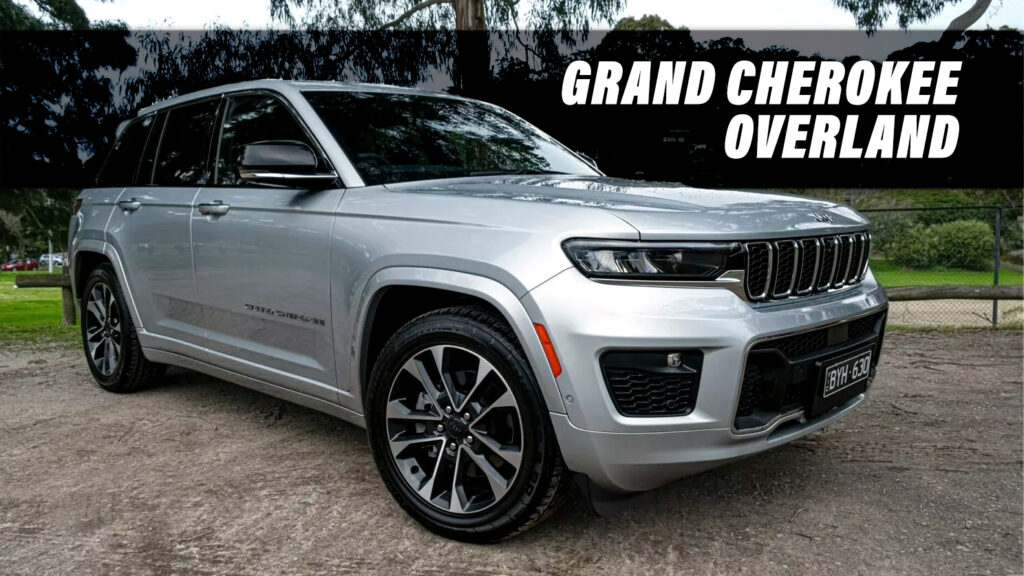
We drive the new generation of the Grand Cherokee in Overland trim, which is significantly more poised and luxurious, but is it all good news?
2 hours ago
When you think of Jeep, your mind will probably jump to hugely capable off-roaders but with the fifth-generation Grand Cherokee, the car manufacturer has set out to create an SUV that is far more luxurious and significantly more comfortable on the road. Has it succeeded?
To find out, we recently spent a week with the 2023 Jeep Grand Cherokee Overland. This model sits above the Night Eagle and Limited variations in Australia but has been positioned below the Summit Reserve 4xe hybrid and the ICE-only Summit Reserve. It is priced from an eye-popping AU$98,450 ($62,536) and while the Summit Reserve starts at AU$115,950 ($73,652), the Overland has to fight off rivals like the Nissan Patrol, Toyota LandCruiser Prado, VW Touareg, and Land Rover Defender if it is to prove popular. Tough competition, then.
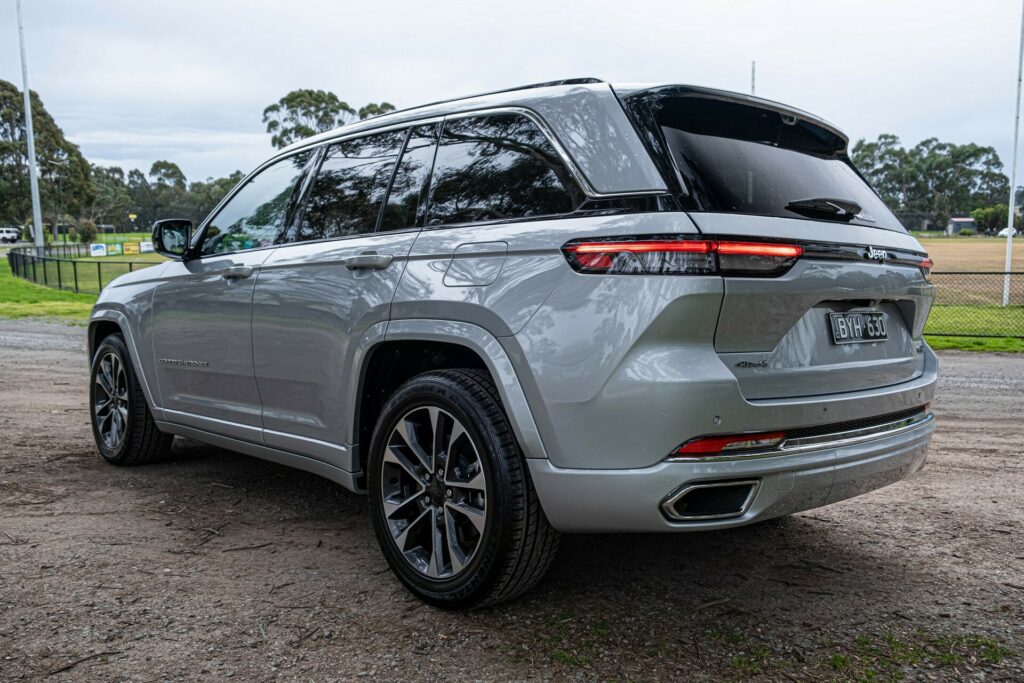
What do you get for your money?
Approaching the 2023 Grand Cherokee Overland for the first time, it’s hard not to be taken aback by its size. It measures 4,914 mm (193.4 inches) long, 2,149 mm (86.3 inches) wide, and stands 1,801 mm (70.9 inches) tall while riding on a 2,964 mm (116.7-inch) wheelbase in the short-wheelbase, five-seat model that we tested. Jeep’s designers have clearly worked tirelessly to make the exterior feel more premium than its predecessor without going overboard.
advertisement scroll to continue
Our test vehicle was finished in Silver Zynith but shoppers have seven other colors to choose from, including particularly striking shades of Velvet Red and Hydro Blue. Regardless of which color is selected, all versions of the Grand Cherokee Overland sold in Australia have chrome surrounds on the front grille and under the headlights. Fitted as standard are 20-inch full polished silver and black wheels wrapped in 265/50 Continental Cross Contact tires, although smaller 18-inch rims are an option.
The cabin
While the exterior of the new-age Grand Cherokee is a significant upgrade over its predecessor, it is in the cabin where the more apparent changes have been made. It is significantly more luxurious than the old model and trimmed in far nicer materials. In fact, when I first jumped inside, I was shocked that I was sitting in something with a Jeep badge.
Review: Jeep Grand Cherokee L Offers Posh Off-Roading For The Whole Crew
The seats are the first thing that catches the eye. Jeep has trimmed them in soft and supple TechnoLeather and added ventilated functions up front and heating both front and rear. Our tester also included the AU$4,500 ($2,858) Luxury Technology Group that adds massage functions to the front seats, ventilation to the rear seats, second-row window shades, a digital rearview mirror, four-zone climate control, 12-way adjustments to the driver and passenger seat, and a wireless charging pad.
Of these additions, it is the massage functions that are most welcome. Both drivers and front passengers can choose between ‘waterfall’, lower back, extend, low extend, and ‘rock climb’ functions, all of which provide different massage patterns.
The impressive elements of the new Grand Cherokee Overland’s interior continue. For example, there is wood paneling stretching across the dashboard, metal elements on the steering wheel, air vents and paddle shifters, soft-touch leather on the dashboard and door panels, a 10.1-inch infotainment display, and a digital instrument cluster. Wireless Apple CarPlay and Android Auto are both supported. Shifting is performed by a rotary dial in the center of the console, a nice luxurious touch but one that is let down by all the piano black plastic that surrounds it. A solid nine-speaker sound system from Alpine also comes standard.
Read: Everything You Wanted To Know About The Jeep Grand Cherokee L
The infotainment screen runs the latest Uconnect operating system. While we don’t think this is the best system on the market, it is one of the most expansive, offering a seemingly never-ending array of menus, sub-menus, and sub-sub-menus and yet, it remains easy and intuitive to use. Among the key menus is one focused on the Jeep’s off-road settings that displays things like the steering angle, various accessory gauges like coolant and transmission temperatures, pitch and roll, and the Breadcrumbs function that will ensure you never get lost while off-roading.
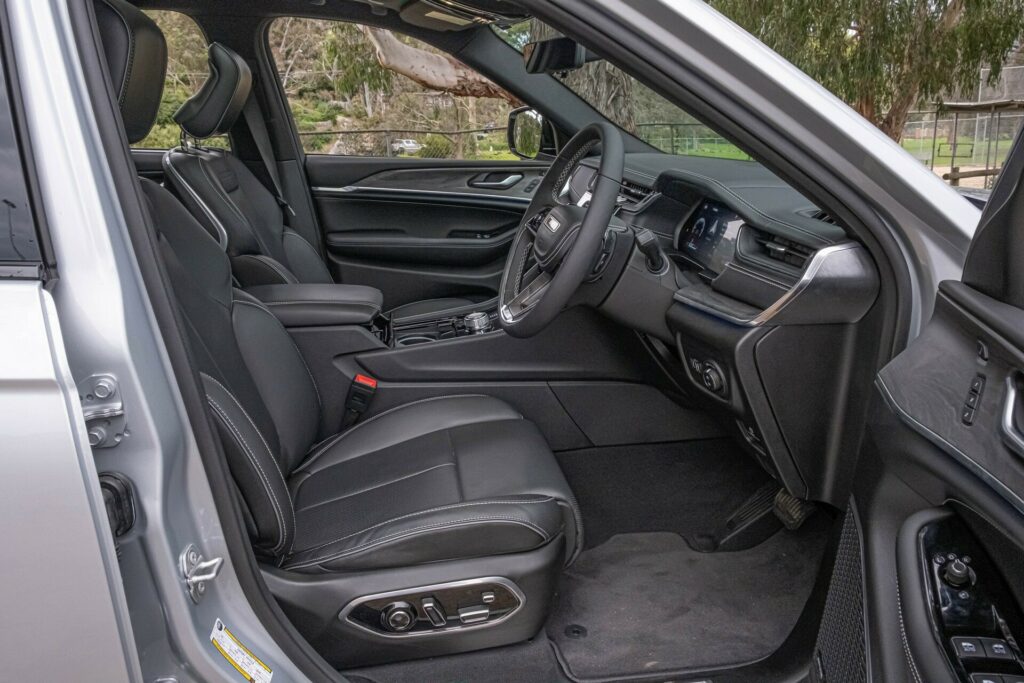
Shoppers will also be pleased to know that the Grand Cherokee can be used with Uconnect Services which allows owners to lock and unlock the vehicle with their paired smartphone. You can also send navigation directions and check important functions.
Passengers in the second row will be just as comfortable as those up front. In addition to the heated and ventilated seats, there is a 150-watt power outlet, two USB-C ports, and two USB-A ports within easy reach. Space is excellent regardless of where you are sitting and the trunk offers a generous 1,067 liters (37.7 cubic feet) of space with the seats in their normal position and 2,005 liters (70.8 cubic feet) when they’re folded down.
Some areas of the cabin do feel a little cheap though. For example, the hard black plastic to the sides of the infotainment screen were rubbing on the edge of the display. The trim on the A-pillars was also a little misaligned.
Compared to the old model, the cabin of this new model is a seismic leap forward. But, what about the rest of the new Grand Cherokee?
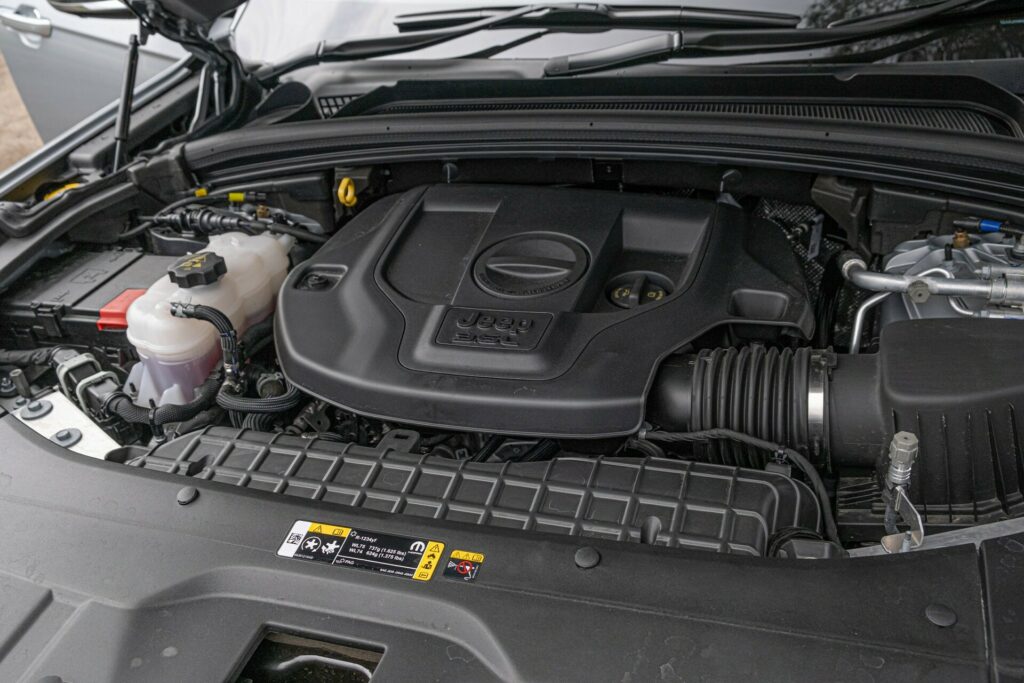
Old but solid powertrain tech
Those who were hopeful that the new-age Grand Cherokee would benefit from an overhauled engine may be disappointed to hear that all standard Australian models come with the brand’s familiar 3.6-liter naturally-aspirated Pentastar V6. The only exception to this is the Summit Reserve 4xe which has a 2.0-liter plug-in hybrid.
While the Pentastar V6 is old, it still offers respectable levels of performance. It is rated at 210 kW (282 hp) and 344 Nm (254 lb-ft) of torque and works alongside an eight-speed automatic transmission driving all four wheels. The engine has a very satisfying thump when you hit the accelerator and sounds quite nice too. It’ll accelerate the SUV to 100 km/h (62 mph) in around 9 seconds too, not bad considering it weighs 2,167 kg (4,777 lbs). The transmission is a nice match for this engine, remaining smooth and consistent when left in automatic mode while also delivering snappy shifts when you use the paddles.
Watch: Will Jeep’s Pitch To Encourage Brand Loyalty Help Its Sales?
All Grand Cherokee Overland models sold in Australia come standard with Jeep’s Quadra Trac II Active 4×4 system as well as Quadra-Lift air suspension with adaptive damping. The air suspension is operated via a switch on the center console and offers five different modes; the lowest for easy entry and exit (Park Mode), the second setting for regular on-road use (Aero Mode), the normal ride height mode, and then Off-Road 1 and Off-Road 2 settings. Regardless of which mode you’re in, the car will revert to Aero Mode if you’re traveling at highway speeds of over 62 mph (100 km/h) and you can also choose to have it lower automatically as soon as you shift into Park. In Off-Road 2, the Grand Cherokee offers up to 276 mm (10.8 inches) of clearance, a 30.1-degree approach angle, and a 28.4-degree departure angle.
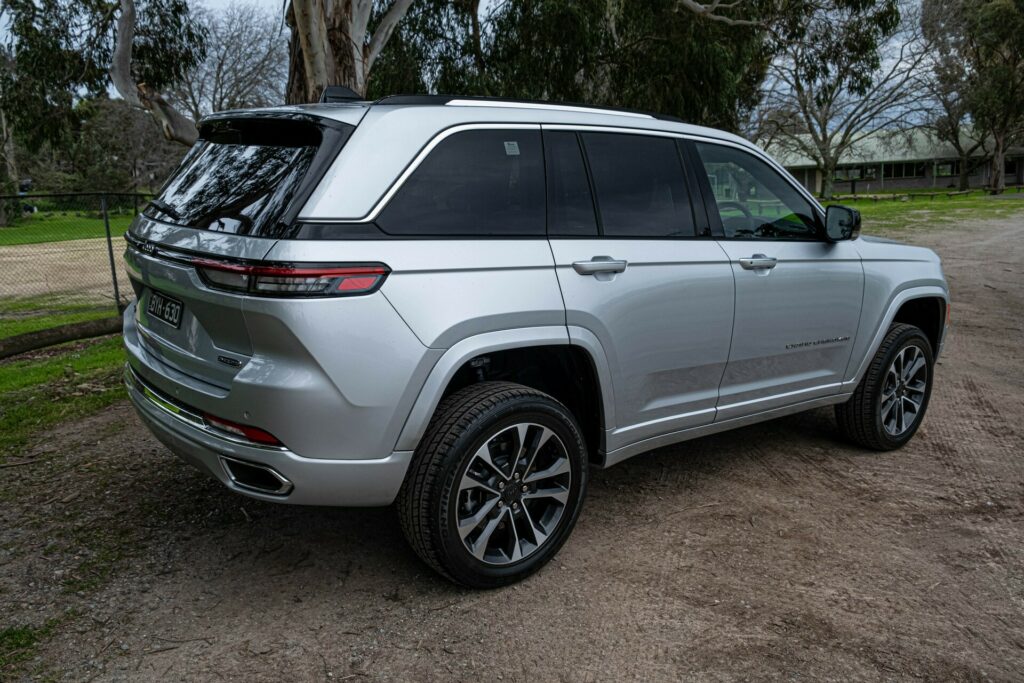
Those seeking to maximize the off-road credentials of the new Grand Cherokee Overland can option the Off-Road Group for AU$2,750 ($1,746). This package adds a 230 mm (9-inch) rear axle, a rear electronic limited-slip differential, 18-inch wheels and Goodyear all-terrain tires, and skid plates over the front suspension, fuel tank, and skid plate.
The on-road polish and poise of the new Grand Cherokee is very impressive and a huge improvement over its predecessor. Its underpinnings are based on those used by the Alfa Romeo Giulia and Stelvio and for a vehicle of this size, it handles very well and as mentioned, the V6 provides more than adequate pull. It can be driven in Sport, Auto, Snow, Sand/Mud, and Rock modes depending on the environment. We stuck to Auto for most of our week with the Jeep and found it to be well-rounded for everyday driving duties.
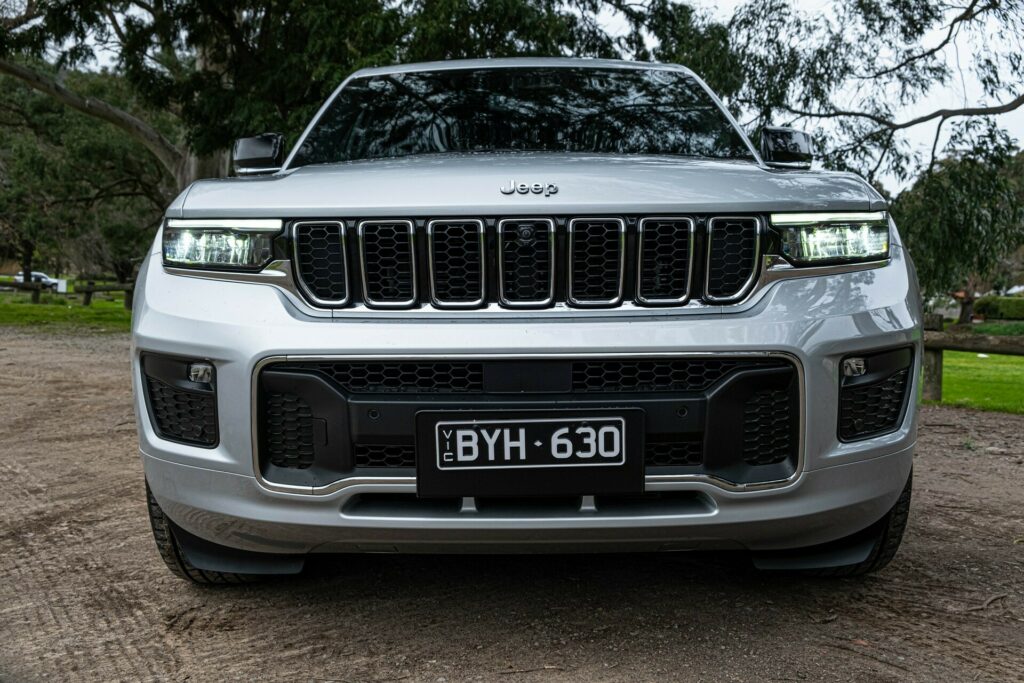
A drawback of the 3.6-liter V6 is that it is quite thirsty. Jeep Australia claims it uses 10.6 l/100 km (22.1 U.S. mpg) over the combined cycle but we averaged 13.0 l/100 km (18 U.S. mpg) and that was while driving very conservatively on an even combination of highways and suburban streets. Fuel consumption can easily exceed 17.0 l/100 km (13.8 U.S. mpg) if you start to hustle the Grand Cherokee. Towing is also a drawback.
With the V6, the SUV can tow 2,813 kg (6,201 lbs) braked or 750 kg (1,653 lbs) unbraked. Those figures are respectable but the old Grand Cherokee with its available diesel engine could tow up to 3,500 kg (7,716 lbs) braked.
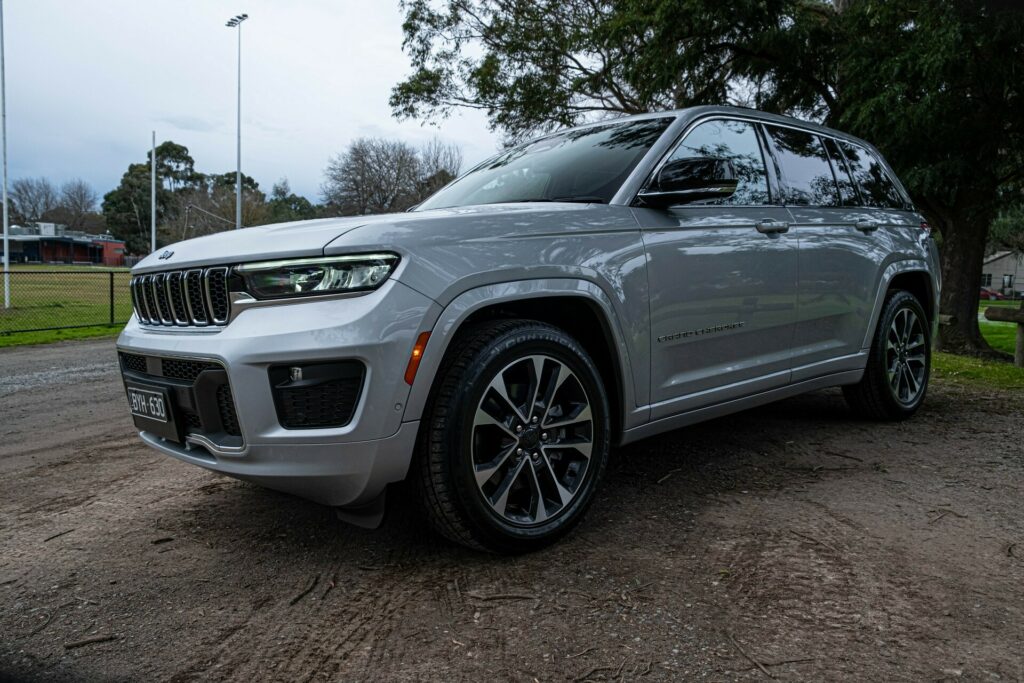
A compelling all-rounder
Our testing schedule didn’t provide us with the time to test the Overland along any particularly demanding off-road trails. However, we were able to test it along some moderately difficult terrain with water, gravel, and deep ruts. It breezed through everything we could throw at it and even if one of the wheels was lifted off the ground, it never showed any signs of difficulty. Industry colleagues tell us that when the going gets really tough, the new model isn’t quite up to the standard of its predecessor, nor rivals like the Patrol and Land Cruiser Prado.
Is this a deal-breaker? Absolutely not. Let’s be honest, very few Jeep Grand Cherokee owners will ever exploit even 10% of their vehicle’s off-roading abilities and the keen on-road focus of this model, in combination with its higher sticker price, likely means even fewer will even venture beyond pavement and perhaps some flat gravel and dirt-covered roads.
